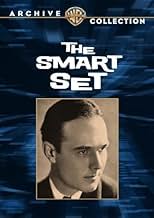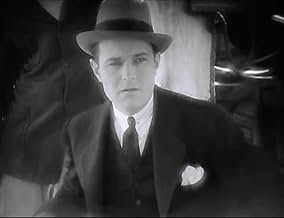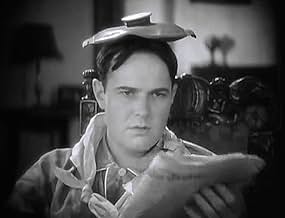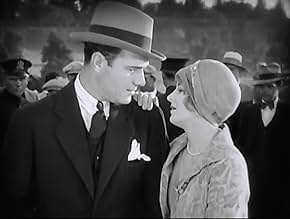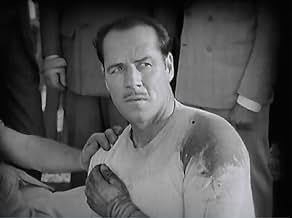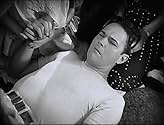VALUTAZIONE IMDb
6,3/10
1089
LA TUA VALUTAZIONE
Aggiungi una trama nella tua linguaAn American polo player, arrogant and full of himself, must vindicate his actions to win the heart of a girl, Polly, after getting himself booted off the U.S. polo team.An American polo player, arrogant and full of himself, must vindicate his actions to win the heart of a girl, Polly, after getting himself booted off the U.S. polo team.An American polo player, arrogant and full of himself, must vindicate his actions to win the heart of a girl, Polly, after getting himself booted off the U.S. polo team.
- Regia
- Sceneggiatura
- Star
Coy Watson
- Sammy
- (as Coy Watson Jr.)
Allan Cavan
- Host at Red Lantern Inn
- (non citato nei titoli originali)
Harry Gribbon
- Tommy's Valet
- (non citato nei titoli originali)
Herbert Prior
- Beleaguered Diner
- (non citato nei titoli originali)
Scott Seaton
- Polo Team Member
- (non citato nei titoli originali)
Harry Tenbrook
- Tommy's Chauffeur
- (non citato nei titoli originali)
Ellinor Vanderveer
- Party Guest
- (non citato nei titoli originali)
Blue Washington
- Horse Groom
- (non citato nei titoli originali)
S.D. Wilcox
- Policeman
- (non citato nei titoli originali)
Recensioni in evidenza
I miss silent movies. Even setting aside that the medium lost something (or many somethings) after transitioning to talkies, the least that could be said is that getting a peek into a world of another era, with the values of another era, is fascinating. Being so far removed from the Roaring Twenties there are of course nonetheless many themes and ideas that are timeless, holding true decades later for better and for worse, but it's also the case that even characters who wouldn't be remotely sympathetic in a modern title - such as, say, the self-absorbed athlete of a sport that's known as recreation for the very wealthy - can be made amusing (to one degree or another) through the lens of the past. And so we have 'The smart set,' produced by titanic figures Louis B. Mayer and Irving Thalberg and released in 1928. Even within only the first several minutes there is much to take in in all the above capacities, and I can't say that it's not enjoyable.
For sure, protagonist Tommy is smarmy, conceited, and unlikable, thoughtlessly putting others at risk and actively disregarding norms, laws, and others' wishes and well-being. He's indistinguishable from the worst of modern men; gag me with a spoon. Yet this flick is built as a comedy, and between the contributions of all involved, it quickly shows itself to be a mild delight. It would be more so if Tommy weren't such a complete ogre - I mean, good grief - yet Byron Morgan penned smart, flavorful, peppy scene writing to fill out the narrative of a buffoonish man in desperate need of self-realization, self-awareness, and redemption. Robert Hopkins, serving up the intertitles, similarly provides some sharp, clever dialogue (and expository slides). This is to say nothing of the spirited acting of the cast, including above all William Haines (Tommy) and Alice Day (Polly), and the capable direction of Jack Conway that maintains a zestful spark about the proceedings.
From top to bottom the writing is full of personality (some really awful personality, but still), and that is unfailingly brought out in the direction and acting. No matter the complexity of stunts or any given sequence, all are orchestrated and executed with a deft, skillful hand, including the polo scenes, which are surely a credit as well to the horses and their trainers. To that same end, cinematographer Oliver T. Marsh illustrates a keen eye for detail just like filmmaker Conway, and we're sure at all times to get eyefuls of that which will meaningfully advance the story and/or add to the fun to be had. Even Sam Zimbalist's editing is notably admirable in my opinion. Of course the crew operating behind the scenes also turned in fine work, including sets, costume design, and hair and makeup, not least in visualizing a bygone era. Provided we can abide how loathsome the protagonist is on his rocky, pothole-ridden path to being even a slightly decent person, is there actually anything amiss in this picture?
Well, there's this: over the course of seven reels, this takes a long, long time to move the needle even a little from deep, deep in the territory of "Tommy is a despicable beast" to the nearest border of "maybe there's hope for him after all." Even at that, it seems to me that while it's all played for gentle entertainment, the humor relies heavily on an ugly mean streak at least as much as if not more than on silliness or wit. Tommy gets away with behavior that he never, ever should, in any timeframe or context, and we as an audience are supposed to find it funny? We're supposed to accept that someone so ghoulish would in any reality be fawned over by women, or should gain sympathy - from anyone - before he demonstrates the slightest contrition? After everything he did we're supposed to extend total forgiveness when, within only the last quarter of the length, he starts to show glimmers of humanity? For good measure, add in late, small moments of racist stereotyping, and a racist joke. Oof.
Suffice to say that by the values of any decade, I believe 'The smart set' is far too willing to give our protagonist a pass for his grave flaws, and is far too willing to accept him back into the good graces of civilized society. The allowances we extend for suspension of disbelief, for fiction, and for comedy only go so far. Still, we do get a character arc, and a duly compelling story, and we do have a good time as is intended. It bears repeating that all involved did a swell job, including the stunts (even through to the end), and inasmuch as this is a sports film, the exhibition is unexpectedly splendid, too. I have problems with this title, but it's still worthwhile on its own merits even almost a full century later. Even if you're wholly enamored with the silent era, as I am, I don't think there's any need to go out of your way for this, but even as you should be aware of the issues on hand 'The smart set' is fairly deserving if you have a chance to check it out.
For sure, protagonist Tommy is smarmy, conceited, and unlikable, thoughtlessly putting others at risk and actively disregarding norms, laws, and others' wishes and well-being. He's indistinguishable from the worst of modern men; gag me with a spoon. Yet this flick is built as a comedy, and between the contributions of all involved, it quickly shows itself to be a mild delight. It would be more so if Tommy weren't such a complete ogre - I mean, good grief - yet Byron Morgan penned smart, flavorful, peppy scene writing to fill out the narrative of a buffoonish man in desperate need of self-realization, self-awareness, and redemption. Robert Hopkins, serving up the intertitles, similarly provides some sharp, clever dialogue (and expository slides). This is to say nothing of the spirited acting of the cast, including above all William Haines (Tommy) and Alice Day (Polly), and the capable direction of Jack Conway that maintains a zestful spark about the proceedings.
From top to bottom the writing is full of personality (some really awful personality, but still), and that is unfailingly brought out in the direction and acting. No matter the complexity of stunts or any given sequence, all are orchestrated and executed with a deft, skillful hand, including the polo scenes, which are surely a credit as well to the horses and their trainers. To that same end, cinematographer Oliver T. Marsh illustrates a keen eye for detail just like filmmaker Conway, and we're sure at all times to get eyefuls of that which will meaningfully advance the story and/or add to the fun to be had. Even Sam Zimbalist's editing is notably admirable in my opinion. Of course the crew operating behind the scenes also turned in fine work, including sets, costume design, and hair and makeup, not least in visualizing a bygone era. Provided we can abide how loathsome the protagonist is on his rocky, pothole-ridden path to being even a slightly decent person, is there actually anything amiss in this picture?
Well, there's this: over the course of seven reels, this takes a long, long time to move the needle even a little from deep, deep in the territory of "Tommy is a despicable beast" to the nearest border of "maybe there's hope for him after all." Even at that, it seems to me that while it's all played for gentle entertainment, the humor relies heavily on an ugly mean streak at least as much as if not more than on silliness or wit. Tommy gets away with behavior that he never, ever should, in any timeframe or context, and we as an audience are supposed to find it funny? We're supposed to accept that someone so ghoulish would in any reality be fawned over by women, or should gain sympathy - from anyone - before he demonstrates the slightest contrition? After everything he did we're supposed to extend total forgiveness when, within only the last quarter of the length, he starts to show glimmers of humanity? For good measure, add in late, small moments of racist stereotyping, and a racist joke. Oof.
Suffice to say that by the values of any decade, I believe 'The smart set' is far too willing to give our protagonist a pass for his grave flaws, and is far too willing to accept him back into the good graces of civilized society. The allowances we extend for suspension of disbelief, for fiction, and for comedy only go so far. Still, we do get a character arc, and a duly compelling story, and we do have a good time as is intended. It bears repeating that all involved did a swell job, including the stunts (even through to the end), and inasmuch as this is a sports film, the exhibition is unexpectedly splendid, too. I have problems with this title, but it's still worthwhile on its own merits even almost a full century later. Even if you're wholly enamored with the silent era, as I am, I don't think there's any need to go out of your way for this, but even as you should be aware of the issues on hand 'The smart set' is fairly deserving if you have a chance to check it out.
Smart Set, The (1928)
** (out of 4)
An obnoxious polo player (William Haines) thinks he's God's gift to everyone so he starts bothering the girl of his dreams (Alice Day), which doesn't sit too well with her boyfriend (Jack Holt). While the polo player gets on everyone's nerves, nothing really happens until he's kicked off the team, which makes the man think about his ways. This comedy isn't too good and is only really remembered for its actor Haines. Haines, an open homosexual, had his career ended by MGM when he refused to break up with his boyfriend but he went on to find fame as an interior decorator. I had heard mixed things about this film but it certainly didn't work for me. Haines' character is so damn obnoxious and mean you want to see him get the hell beat out of him and his "change" comes so quick that it's not believable for a single second. Alice Day doesn't lend much to her role either but Holt is pretty good in his small, supporting role. The comedy is pretty light and mainly relies on Haines bothering everyone, which again is annoying and not funny.
** (out of 4)
An obnoxious polo player (William Haines) thinks he's God's gift to everyone so he starts bothering the girl of his dreams (Alice Day), which doesn't sit too well with her boyfriend (Jack Holt). While the polo player gets on everyone's nerves, nothing really happens until he's kicked off the team, which makes the man think about his ways. This comedy isn't too good and is only really remembered for its actor Haines. Haines, an open homosexual, had his career ended by MGM when he refused to break up with his boyfriend but he went on to find fame as an interior decorator. I had heard mixed things about this film but it certainly didn't work for me. Haines' character is so damn obnoxious and mean you want to see him get the hell beat out of him and his "change" comes so quick that it's not believable for a single second. Alice Day doesn't lend much to her role either but Holt is pretty good in his small, supporting role. The comedy is pretty light and mainly relies on Haines bothering everyone, which again is annoying and not funny.
Another of the "Haines Formula" films from MGM in the late silent era casts William Haines as a wealthy polo player, but because this is a Haines film, he's also a swell-headed, brash, brat. He meets a girl (Alice Day) and of course her father (Hobart Bosworth) is also a polo player and she's being pursued by the polo team captain (Jack Holt).
The Haines films were the "feel good" movies of their day. Haines was a terrific comic actor, never afraid of making a total ass of himself. Part of the fun of a Haines film is seeing how bratty and obnoxious he can get because you know he'll get his comeuppance through some "rite of passage" and become a man, win the girl, and save the day.
THE SMART SET is filled with nice comedy bits of business until the big dramatic finale. Holt and Day are OK, and Haines is front and center as STAR. Haines covered most sports and arms of the military in making his films so that the "big game" finale is almost unimportant. He's made the change to manhood and that's really what the finale is about.
I can't think of another actor who could have gotten away with the comic antics Haines displays on screen. The gay subtext is impossible not to see now but apparently contemporary audiences were pretty much unaware. Haines could certainly have made it in films simply by being a romantic leading man--he had the looks. But he invented a unique character in films: the bratty silly goof who always goes too far before he realizes his mistakes. The character didn't play quite so well in talkies but Haines continued the basic formula in most of his films.
Jack Holt starred in a few films with Ralph Graves that seemed to be trying to copy this formula--DIRIGIBLE and FLIGHT come to mind--but without Haines the films were pale copies. Alice Day was the sister of Marceline Day.
Haines made about a dozen talkies, including cameos as himself in a few films. The films were popular but forgettable, although FAST LIFE, REMOTE CONTROL, JUST A GIGOLO, and GET-RICH-QUICK WALLINGFORD are all pretty good.
The Haines films were the "feel good" movies of their day. Haines was a terrific comic actor, never afraid of making a total ass of himself. Part of the fun of a Haines film is seeing how bratty and obnoxious he can get because you know he'll get his comeuppance through some "rite of passage" and become a man, win the girl, and save the day.
THE SMART SET is filled with nice comedy bits of business until the big dramatic finale. Holt and Day are OK, and Haines is front and center as STAR. Haines covered most sports and arms of the military in making his films so that the "big game" finale is almost unimportant. He's made the change to manhood and that's really what the finale is about.
I can't think of another actor who could have gotten away with the comic antics Haines displays on screen. The gay subtext is impossible not to see now but apparently contemporary audiences were pretty much unaware. Haines could certainly have made it in films simply by being a romantic leading man--he had the looks. But he invented a unique character in films: the bratty silly goof who always goes too far before he realizes his mistakes. The character didn't play quite so well in talkies but Haines continued the basic formula in most of his films.
Jack Holt starred in a few films with Ralph Graves that seemed to be trying to copy this formula--DIRIGIBLE and FLIGHT come to mind--but without Haines the films were pale copies. Alice Day was the sister of Marceline Day.
Haines made about a dozen talkies, including cameos as himself in a few films. The films were popular but forgettable, although FAST LIFE, REMOTE CONTROL, JUST A GIGOLO, and GET-RICH-QUICK WALLINGFORD are all pretty good.
THE SMART SET (1928) is a typical late silent era feature that M.G.M. cranked out to fulfill their quota of fifty (50) plus features a year. Even though a 'small' film it clearly shows that it was made by a major studio and has all the standard M.G.M. gloss.
THE NUTS; BlowHard and Egocentric Polo Star Thomas 'Tommy' Van Buren (William Haines) is selected to join America's Big Four championship polo team. Upon arrival he manages to put off his teammates starting with team Captain, Nelson (Jack Holt). He promptly moves in on Nelson's intended love interest Polly Durant (Alice Day) who he had met earlier in a failed pickup. Tommy also offends her Father, Mr. Durant (Hobart Bosworth), who he has replaced on the team. Story continues with his suspension from the team an act of heroism and finally redemption in the championship match against Great Britain, winning the girl. Standard stuff all around.
The main problem with the film is with its Star, matinée idol WILLIAM HAINES. His constant mugging and upstaging of his costars is more appropriate to Mack Sennett then M.G.M. He performs antics in this film that would endear him only to his Mother and only if she was addle headed. Some have commented on that his career failed because of his homosexuality. That may have been true but it was more likely his style did not translate well to the sound era. Not the era of JAMES CAGNEY, GARY COOPER, CLARK GABLE, WILLIAM POWELL, SPENCER TRACY, etc. They defined how a man was to act in sound. In fact his acting in silent films is hard to take today, especially compared to his contemporaries RONALD COLMAN, LON CHANEY, JOHN GILBERT and RAMON NOVARRO. Whos films do hold up well in the 21st Century. As hard to take as HAINES was the rather ordinary looking ALICE DAY. The rest of the cast did the best they could with what little they had to work with.
Though we gave it a relatively low rating of four (4) stars**** it is still worth a watch at least once. The print on TCM is in fairly good condition and it is interesting to see a film revolving around the sport of Polo. Which appears to be like Hockey on Horses.
ADDENDUM; Went back too this film today (04/08/09) on TCM too see if a second look would alter our opinion. No, HAINES still comes off as a 'Prissy Ham' with none of the charm he showed in SHOW PEOPLE (1928), the first of his films we had seen.
THE NUTS; BlowHard and Egocentric Polo Star Thomas 'Tommy' Van Buren (William Haines) is selected to join America's Big Four championship polo team. Upon arrival he manages to put off his teammates starting with team Captain, Nelson (Jack Holt). He promptly moves in on Nelson's intended love interest Polly Durant (Alice Day) who he had met earlier in a failed pickup. Tommy also offends her Father, Mr. Durant (Hobart Bosworth), who he has replaced on the team. Story continues with his suspension from the team an act of heroism and finally redemption in the championship match against Great Britain, winning the girl. Standard stuff all around.
The main problem with the film is with its Star, matinée idol WILLIAM HAINES. His constant mugging and upstaging of his costars is more appropriate to Mack Sennett then M.G.M. He performs antics in this film that would endear him only to his Mother and only if she was addle headed. Some have commented on that his career failed because of his homosexuality. That may have been true but it was more likely his style did not translate well to the sound era. Not the era of JAMES CAGNEY, GARY COOPER, CLARK GABLE, WILLIAM POWELL, SPENCER TRACY, etc. They defined how a man was to act in sound. In fact his acting in silent films is hard to take today, especially compared to his contemporaries RONALD COLMAN, LON CHANEY, JOHN GILBERT and RAMON NOVARRO. Whos films do hold up well in the 21st Century. As hard to take as HAINES was the rather ordinary looking ALICE DAY. The rest of the cast did the best they could with what little they had to work with.
Though we gave it a relatively low rating of four (4) stars**** it is still worth a watch at least once. The print on TCM is in fairly good condition and it is interesting to see a film revolving around the sport of Polo. Which appears to be like Hockey on Horses.
ADDENDUM; Went back too this film today (04/08/09) on TCM too see if a second look would alter our opinion. No, HAINES still comes off as a 'Prissy Ham' with none of the charm he showed in SHOW PEOPLE (1928), the first of his films we had seen.
Despite his vast popularity 90 years ago, Mr. Haines is best described in today's terms as insufferable. I have many of his films on my hard drive due to the fact that MGM put him opposite most, perhaps all, of the reigning beautiful actresses of that time. This go round it was Alice Day's turn and a rare opportunity to see her in good quality up close. Her party dress was completely over the top in flapperism and her cloche hats were superb. The automobiles were great, that Packard roadster can come home and live in my garage! Did you notice how reliable old Jack Holt had a hairline which varied from scene to scene? Worth watching this movie as an exemplar of MGM at the pinnacle of its silent craft. Spoiled by the endless mugging of you know who.
Lo sapevi?
- QuizTommy and Polly first meet at the intersection of Selma Ave. and Cahuenga Ave. in Hollywood. The Marion Building featuring the Chrisney Drug Co. sign still stands as of 2023. The corner entrance famously housed The Spotlight, a gay bar, from 1963 to 2011.
- Citazioni
Title Card: A dry morning after a wet night.
- Versioni alternativeIn 2007, Turner Entertainment Co. copyrighted a 80-minute version of this film, with a new musical score composed by Marcus Sjowall.
- ConnessioniReferences Il cavallo d'acciaio (1924)
I più visti
Accedi per valutare e creare un elenco di titoli salvati per ottenere consigli personalizzati
Dettagli
- Data di uscita
- Paese di origine
- Lingue
- Celebre anche come
- Умный набор
- Luoghi delle riprese
- Selma Ave. and Cahuenga Ave., LA, California, Stati Uniti(Tommy and Polly first meet in front of the Marion Building - still stading 2023)
- Azienda produttrice
- Vedi altri crediti dell’azienda su IMDbPro
- Tempo di esecuzione1 ora 20 minuti
- Colore
- Mix di suoni
- Proporzioni
- 1.33 : 1
Contribuisci a questa pagina
Suggerisci una modifica o aggiungi i contenuti mancanti

Divario superiore
By what name was The Smart Set (1928) officially released in Canada in English?
Rispondi
